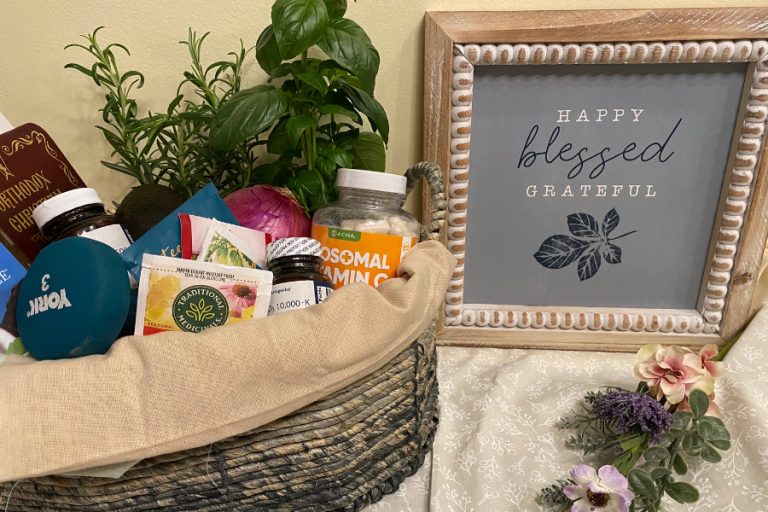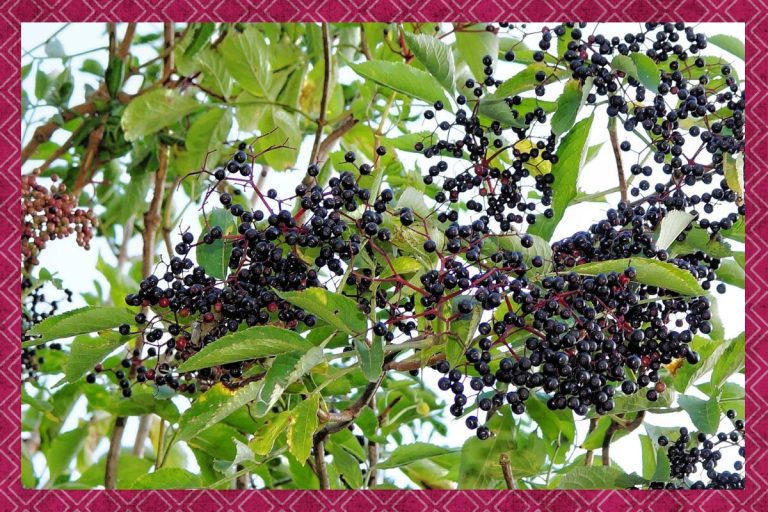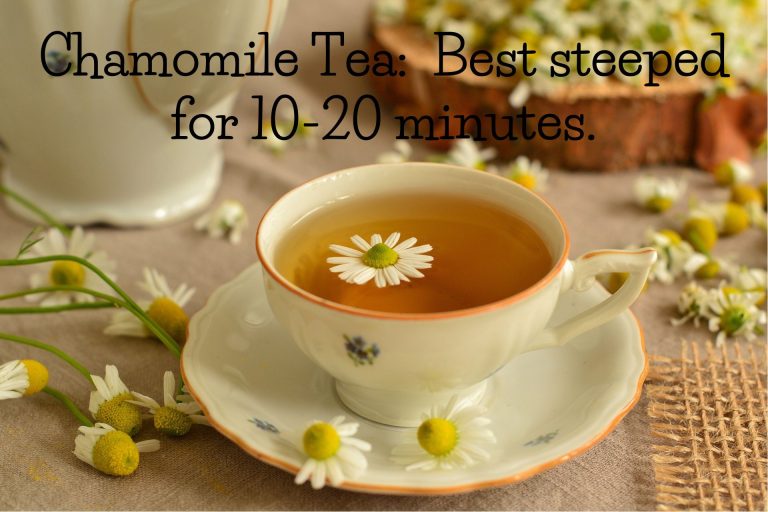Herb of the Month: Lemon Balm
This post may contain affiliate links. View our disclosure policy here.
The March Herb of the Month, Lemon Balm (Melissa offiinalis), is nothing short of amazing! I first learned about Lemon Balm in my herbalism classes I take through a wonderful online school out of Boston. Check out CommonWealth Holistic Herbalism today if you are interested in learning more after today’s post (please note: I am a student of this school but am not an affiliate. I do not benefit from sending you their way- the benefit is all yours!)
We all have stress. Do you know ANYONE who is not struggling with SOMETHING right now? Lovely lemon balm is truly a wonderfully delicious herb to incorporate into your day to help you cope with stress and worries. Let’s talk about this fragrant member of the mint family -it’s health benefits, how easy it is to grow the lemon balm plant, how to work with it and I’ll share some tasty lemon balm tea recipes too!

Herb of the Month: Lemon Balm – The Basics
Family: Labiatae
Latin Name: Melissa officinalis
Medicinal Parts: flowers and leaves
Energetics: cool, dry, relaxant
Actions: anodyne, antiviral, diaphoretic, nervine, relaxant, sedative * Lemon Balm is unique in that it initially has a warming action but followed by a cooling action.
Medicinal Benefits: Applications and Practice
The Gladdening Herb
Melissa officinalis, commonly referred to as Lemon Balm has a nickname that some use. It is the ‘gladdening herb’. I think you can understand why. This herb is also commonly referred to as ‘Melissa’. As a mild relaxant, Lemon balm is suitable to address muscle tension caused by worry or stress. It is a nervine, meaning they help strengthen and ‘feed’ the nervous system. This is really beneficial for nerve pain and constrictive, tension headaches.
A Gentle Herb
Safe for nearly everyone (individual allergies aside), Lemon Balm is considered a very gentle herb. Yet it is highly effective for a number of wellness needs. As stated above, Lemon Balm is a mild relaxant and nervine. It also has a gentle sedative activity which makes it highly beneficial for anxiety, agitation, ADD, ADHD, depression (including seasonal affective disorder),and sleep issues/insomnia.
A Protective Herb
Lemon Balm is even an anti-viral herb! Its’ protective ability to manage viruses specific to the herpes family (cold sores, chicken pox, shingles, oral and genital herpes, etc.) as well as colds and flu is pretty amazing. It can be beneficial for high fevers from these types of viruses as well.
Other Medicinal Benefits
Some studies have indicated Lemon Balm may have some ability to protect the heart and liver. It seems to reduce occurrences of tachycardia and fibrillation within the heart and may help regulate heart arrhythmias.
A 2012 study also suggested that lemon balm essential oil may have an ability to lower high triglycerides and improving cholesterol synthesis in the liver. Also, apparently the inhalation of the oil of lemon balm may reduce factors which lead to growth of a common liver cancer cell.
Some resources suggest Lemon Balm may be beneficial for assisting with dementia. It may improve attention and memory. Other evidence points to its benefits for indigestion. Lemon balm is a known digestive stimulant.
The Lemon Balm Plant

When the leaves of lemon balm are crushed the smell is very similar to lemons. This scent is unmistakable when you rub the oval leaves with scalloped edges and its soft hairs. Lemon Balm flowers can be white, pale yellow or light pink. Bees love the lemon balm flowers!
The perennial plant grows up to three feet tall in average soil and full sun but what’s nice is that it does tolerate art shade. I found some at the bottom of a hill in my yard last summer. I hadn’t realized it was there before as we just don’t go down the hill all that much. There is a HUGE patch of Lemon Balm next to the tree line which, in my opinion, is more shade than sun. So while it says full sun in most description, it does pretty well here with shade. I’m so thrilled to have found it. I will be spending more time at the bottom of the hill! I hear it’s uplifting to just sit with a large amount of Lemon Balm plants!
Lemon Balm comes up in every list of ‘easy to grow herbs’ I have looked at recently in my list making for this year’s spring gardening. I already have plenty much to my delight but I’d encourage you to add it to your own herb garden.
Be careful though, it’s not quite as overtaking as other mints, but it does spread quickly. One way to help that is by harvesting those flowers fairly soon after blooming – though you could at least give a few to the pollinators! Another way to prevent them from overtaking the herb garden is by planting them in containers of some sort- it does great in pots and buckets. It’s an easy plant to care for as it can tolerate a couple weeks without water, so not something you need to care for daily.
Lemon Balm Applications
Remember when I mentioned harvesting the flowers earlier? You can take those flowers and infuse them into honey for a lovely flavor! Add this infused honey to seltzer water for a delicious refreshing summer drink!
Lemon Balm is delicious on its own and is a semi-sweet yummy addition to an herbal tea blend with other nervines or relaxants that are not as sweet tasting. If making a tea with lemon balm, be sure to cover it while steeping so as to retain the benefits from the volatile oils.
You can make a lovely tincture from Lemon Balm. In my coursework it was said that fresh herbs are best for making Lemon Balm tinctures but I covered that AFTER I had made some of my own. I still had a kit that I got from Herbal Revolution in which I had an amount of dried herb for tincture and a bottle and I think it made a lovely tincture. I found it turned out, even made with vodka, to have a more pleasant taste than most tinctures.
Some people have infused a large batch of lemon balm tea to add to their bath at night and say it helps induce relaxation for bedtime.
Lemon Balm can be used in the kitchen for other things besides tea too! Try adding the lemony leaves to a fresh garden salad. Add to your herbal seasonings for fish or poultry! Yummy!
Want to Purchase Lemon Balm and Other Herbs?
Here’s a few of my favorite places to buy dried Lemon Balm and other herbs/teas and tinctures. Check out the recipes below to make your own blends!
- Foster Farm Botanicals – have a lovely assortment of herbs including Lemon Balm
- Mountain Rose Herbs- have an enormous variety of herbs and tinctures and tea making supplies
- Starwest Botanicals – another great source for herbs
- Traditional Medicinals – for Lemon Balm if you prefer your herbs already in tea bags
- Amazon – here’s a few affiliate links if you prefer a quick purchase on Amazon
Cautions
Lemon Balm is considered a very safe plant for nearly everyone, including children. There is some cautionary remarks in some sources that indicate if used daily, Lemon Balm may be contraindicated in hypothyroidism. This means if you have hypothyroidism, an occasional cup of tea wouldn’t cause a problem but you may want to consult a physician and/or professional herbalist before consistent daily consumption.
Lemon Balm Tea Recipes
Would you like to make some tea of your own? Grab a few dried herbs from the sources above (unless of course you have some fresh lemon balm in your garden already – yay for you!). I encourage ORGANIC herbs always to avoid toxins in the forms of pesticides and have foods raised in healthy soils. You don’t want to add negatives to your health at the same time your delivering relaxing nourishment. So please, if you can afford the extra expense, go for the healthier option.
Lemon Balm Tea
For a simple cup of tea, simply steep about 2 heaping teaspoons of lemon balm on it’s own for every 8-10 oz. of hot water. Remember to cover your tea while steeping to keep the benefits of the volatile oils! Steep for 5 minutes or up to 2hours or overnight! Experiment with your infusion. Try a little less herb or a little more. Try a little less water or a little more. Steep longer. A cold infusion works well for Lemon Balm too! Fill a mason jar with a few teaspoons of lemon balm and fill with water. Let it sit overnight on the counter or in the refrigerator! See what you love best!
Happy Tea Blend
This one is simple too and calls for Chamomile- another amazing herb I’ve written about!
- 1 teaspoon Lemon Balm
- 1/2 teaspon Chamomile
- 8-10 oz. water
Allow to steep 5-15 minutes.
Cat’s Purr Tea Blend
Make this up and store it in a small jar to have on hand. I wrote the recipe in ‘parts’. The quantity is up to you. A ‘part’ could be a teaspoon for a small batch, a 1/4 cup or more for a larger batch or anything in-between. The original recipe was one I found in my course notes from CommonWealth Herbs.
- 3 parts catnip
- 2 parts damiana (I’m thinking tulsi would work well here if you have that on hand and not damiana)
- 1 part lemon balm
- 1 part linden
- 1 part rose petals
Sleepy Balm Tea Blend
Having trouble sleeping? Feeling extra tense in the evening? Try this simple blend to soothe you at bedtime! Steep about 2 tsp. of the blend with 8-10 oz. of hot water. Steep for 5-15 minutes. Add honey or natural sweetener of choice if desired.
- 4 parts lemon balm
- 2 parts chamomile
- 1 part valerian root (optional)
- 1/2 part lavender
Sweet Lemony Tulsi Blend
Want a nice refreshing drink for a hot day or just desiring sweetness and something calming? Steep about 2 tsp. of the blend with 8-10 oz. of hot water. Steep for 5-15 minutes. Add honey or natural sweetener of choice if desired.
- 1 part Tulsi (learn about Tulsi in last month’s Herb of the Month post!)
- 2 parts Lemon Balm
- 2 parts Hibiscus







I love that you found some! I’ve been hesitant to put it in the ground because it does spread so much but then again, I can think of worse things to overtake my yard! I use it so much 4 big pots was not enough for me.
I’ve learned a lot more about it over the winter and found my stash I had forgotten about (had a huge binge a year ago of buying way too many herbs-lol) and Ive been blending it with my tulsi and some other things almost daily recently! I will try to bring some inside for next winter.
I can never get enough lemon balm. I grow it in my garden and it relaxes me so much!
I think I’m going to add it to different spots in my yard so I will smell it more often!